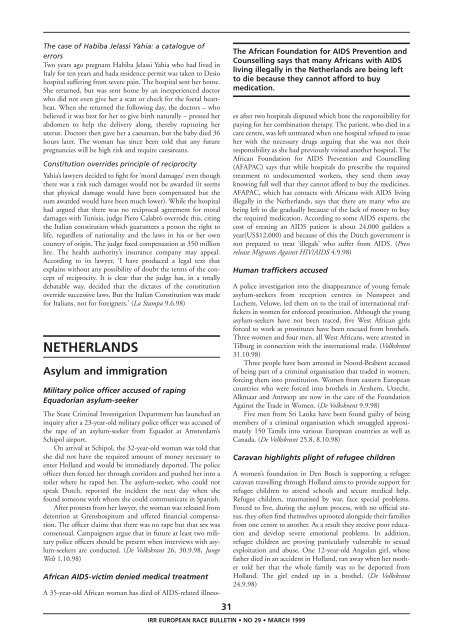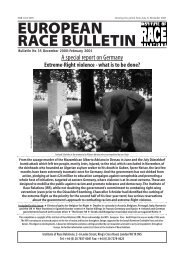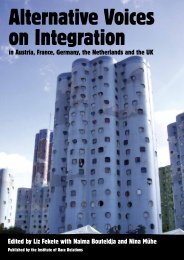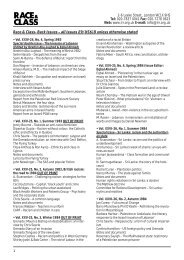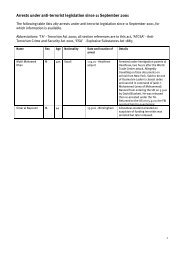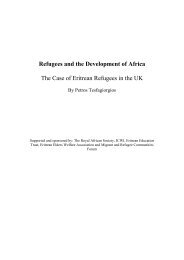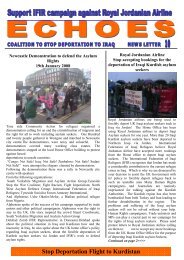EUROPEAN RACE BULLETIN - Institute of Race Relations
EUROPEAN RACE BULLETIN - Institute of Race Relations
EUROPEAN RACE BULLETIN - Institute of Race Relations
Create successful ePaper yourself
Turn your PDF publications into a flip-book with our unique Google optimized e-Paper software.
The case <strong>of</strong> Habiba Jelassi Yahia: a catalogue <strong>of</strong>errorsTwo years ago pregnant Habiba Jelassi Yahia who had lived inItaly for ten years and hada residence permit was taken to Desiohospital suffering from severe pain. The hospital sent her home.She returned, but was sent home by an inexperienced doctorwho did not even give her a scan or check for the foetal heartbeat.When she returned the following day, the doctors – whobelieved it was best for her to give birth naturally – pressed herabdomen to help the delivery along, thereby rupturing heruterus. Doctors then gave her a caesarean, but the baby died 36hours later. The woman has since been told that any futurepregnancies will be high risk and require caesareans.Constitution overrides principle <strong>of</strong> reciprocityYahia’s lawyers decided to fight for ‘moral damages’ even thoughthere was a risk such damages would not be awarded (it seemsthat physical damage would have been compensated but thesum awarded would have been much lower). While the hospitalhad argued that there was no reciprocal agreement for moraldamages with Tunisia, judge Piero Calabrò overrode this, citingthe Italian constitution which guarantees a person the right tolife, regardless <strong>of</strong> nationality and the laws in his or her owncountry <strong>of</strong> origin. The judge fixed compensation at 350 millionlire. The health authority’s insurance company may appeal.According to its lawyer, ‘I have produced a legal text thatexplains without any possibility <strong>of</strong> doubt the terms <strong>of</strong> the concept<strong>of</strong> reciprocity. It is clear that the judge has, in a totallydebatable way, decided that the dictates <strong>of</strong> the constitutionoverride successive laws. But the Italian Constitution was madefor Italians, not for foreigners.’ (La Stampa 9.6.98)NETHERLANDSAsylum and immigrationMilitary police <strong>of</strong>ficer accused <strong>of</strong> rapingEquadorian asylum-seekerThe State Criminal Investigation Department has launched aninquiry after a 23-year-old military police <strong>of</strong>ficer was accused <strong>of</strong>the rape <strong>of</strong> an asylum-seeker from Equador at Amsterdam’sSchipol airport.On arrival at Schipol, the 32-year-old woman was told thatshe did not have the required amount <strong>of</strong> money necessary toenter Holland and would be immediately deported. The police<strong>of</strong>ficer then forced her through corridors and pushed her into atoilet where he raped her. The asylum-seeker, who could notspeak Dutch, reported the incident the next day when shefound someone with whom she could communicate in Spanish.After protests from her lawyer, the woman was released fromdetention at Grenshospitum and <strong>of</strong>fered financial compensation.The <strong>of</strong>ficer claims that there was no rape but that sex wasconsensual. Campaigners argue that in future at least two militarypolice <strong>of</strong>ficers should be present when interviews with asylum-seekersare conducted. (De Volkskrant 26, 30.9.98, JungeWelt 1.10.98)African AIDS-victim denied medical treatment31IRR <strong>EUROPEAN</strong> <strong>RACE</strong> <strong>BULLETIN</strong> • NO 29 • MARCH 1999The African Foundation for AIDS Prevention andCounselling says that many Africans with AIDSliving illegally in the Netherlands are being leftto die because they cannot afford to buymedication.A 35-year-old African woman has died <strong>of</strong> AIDS-related illnessesafter two hospitals disputed which bore the responsibility forpaying for her combination therapy. The patient, who died in acare centre, was left untreated when one hospital refused to issueher with the necessary drugs arguing that she was not theirresponsibility as she had previously visited another hospital. TheAfrican Foundation for AIDS Prevention and Counselling(AFAPAC) says that while hospitals do prescribe the requiredtreatment to undocumented workers, they send them awayknowing full well that they cannot afford to buy the medicines.AFAPAC, which has contacts with Africans with AIDS livingillegally in the Netherlands, says that there are many who arebeing left to die gradually because <strong>of</strong> the lack <strong>of</strong> money to buythe required medication. According to some AIDS experts, thecost <strong>of</strong> treating an AIDS patient is about 24,000 guilders ayear(US$12,000) and because <strong>of</strong> this the Dutch government isnot prepared to treat ‘illegals’ who suffer from AIDS. (Pressrelease Migrants Against HIV/AIDS 4.9.98)Human traffickers accusedA police investigation into the disappearance <strong>of</strong> young femaleasylum-seekers from reception centres in Nunspeet andLuchem, Veluwe, led them on to the trail <strong>of</strong> international traffickersin women for enforced prostitution. Although the youngasylum-seekers have not been traced, five West African girlsforced to work as prostitutes have been rescued from brothels.Three women and four men, all West Africans, were arrested inTilburg in connection with the international trade. (Volkskrant31.10.98)Three people have been arrested in Noord-Brabent accused<strong>of</strong> being part <strong>of</strong> a criminal organisation that traded in women,forcing them into prostitution. Women from eastern Europeancountries who were forced into brothels in Arnhem, Utrecht,Alkmaar and Antwerp are now in the care <strong>of</strong> the FoundationAgainst the Trade in Women. (De Volkskrant 9.9.98)Five men from Sri Lanka have been found guilty <strong>of</strong> beingmembers <strong>of</strong> a criminal organisation which smuggled approximately150 Tamils into various European countries as well asCanada. (De Volkskrant 25.8, 8.10.98)Caravan highlights plight <strong>of</strong> refugee childrenA women’s foundation in Den Bosch is supporting a refugeecaravan travelling through Holland aims to provide support forrefugee children to attend schools and secure medical help.Refugee children, traumatised by war, face special problems.Forced to live, during the asylum process, with no <strong>of</strong>ficial status,they <strong>of</strong>ten find themselves uprooted alongside their familiesfrom one centre to another. As a result they receive poor educationand develop severe emotional problems. In addition,refugee children are proving particularly vulnerable to sexualexploitation and abuse. One 12-year-old Angolan girl, whosefather died in an accident in Holland, ran away when her mothertold her that the whole family was to be deported fromHolland. The girl ended up in a brothel. (De Volkskrant24.9.98)


